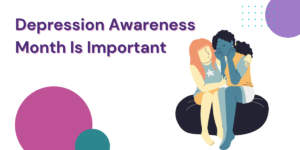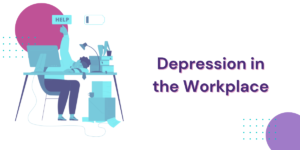Blog

October is Depression Awareness Month, a time to bring attention to one of the most common, yet often misunderstood, mental health conditions. Depression touches approximately 280 million people living around the world – across all ages and backgrounds, but because of the stigma surrounding mental health, many people still suffer in silence. This month is all about changing that—raising awareness, encouraging people to seek help, and breaking down the barriers that keep people from getting the care they need.
What Is Depression?
Depression, or major depressive disorder (MDD), is much more than just feeling sad. It’s a serious medical condition that can affect how someone feels, thinks, and goes about their daily activities. People with depression often struggle with basic tasks like eating, sleeping, and even getting out of bed. It’s not something you can just “snap out of” or “get over.”
The statistics are staggering: approximately 21 million adults in the U.S. experienced at least one major depressive episode in 2020—that’s about 8.4% of the population. Depression can affect anyone, and its effects are wide-ranging, from changes in appetite and sleep patterns to feelings of hopelessness or thoughts of suicide.
Symptoms of depression can vary, but here are some of the most common:
- Persistent feelings of sadness or emptiness
- Loss of interest or pleasure in activities once enjoyed
- Difficulty concentrating, remembering things, or making decisions
- Changes in appetite (eating too much or too little)
- Fatigue or loss of energy
- Feelings of worthlessness or excessive guilt
- Thoughts of death or suicide
Recognizing these signs and understanding that depression is a serious condition is the first step toward offering support and encouraging someone to seek help.

Depression Awareness Month Is Important
Despite its prevalence, depression is often misunderstood or overlooked. Far too many people believe that depression is simply a matter of willpower—that someone just needs to “be more positive” or “try harder.” But that’s not how depression works. It’s a medical condition that can’t be wished away, and unfortunately, the stigma around mental health prevents many from seeking the help they need.
Depression Awareness Month is crucial because it opens up the conversation. The more we talk about depression, the more we can educate people, reduce stigma, and encourage those who are struggling to reach out for support.
The Importance of Early Intervention
Early intervention is key when it comes to depression. Left untreated, depression can become more severe and more difficult to manage. When people seek help early, they’re more likely to recover faster and experience fewer long-term effects. This is why it’s so important to recognize the symptoms of depression early and encourage loved ones to seek professional help as soon as possible.
In addition, depression often occurs alongside other mental health conditions like anxiety or post-traumatic stress disorder (PTSD). Addressing depression early can prevent these co-occurring conditions from worsening and can make treatment more effective.
What Are the Treatment Options?
The good news is that depression is treatable, and with the right combination of therapies, most people can manage their symptoms and lead fulfilling lives. Here’s a breakdown of the most common treatment options for depression:
- Therapy: Talk therapy, particularly Cognitive Behavioral Therapy (CBT), is one of the most effective ways to treat depression. CBT helps individuals identify negative thought patterns and replace them with healthier ones. It’s often combined with medication for the best results.
- Medication: Antidepressants, like SSRIs (Selective Serotonin Reuptake Inhibitors) and SNRIs (Serotonin-Norepinephrine Reuptake Inhibitors), are commonly prescribed to help regulate mood. While these medications don’t work immediately, they can significantly reduce symptoms when taken as prescribed. It’s important for patients to work closely with their doctors to monitor side effects and effectiveness.
- Lifestyle Changes: Regular exercise, maintaining a healthy diet, and getting enough sleep can have a big impact on managing depression. Physical activity releases endorphins, which are natural mood boosters, and a healthy routine can help stabilize energy levels and improve overall well-being.
- Support Groups: For many people, talking to others who understand what they’re going through can be incredibly helpful. Support groups offer a safe space to share experiences, offer advice, and provide encouragement.
- Mindfulness and Meditation: Practices like mindfulness meditation can help people stay grounded in the present moment and avoid getting caught up in negative thought patterns. These practices can be especially useful in managing the emotional ups and downs associated with depression.
In cases where traditional treatments don’t work, other options like electroconvulsive therapy (ECT) or newer treatments like transcranial magnetic stimulation (TMS) and ketamine therapy are also available.

Depression in the Workplace
Depression doesn’t just affect individuals—it can have a big impact on the workplace, too. Employees struggling with depression often experience difficulties with focus, productivity, and absenteeism. The Centers for Disease Control and Prevention (CDC) estimates that depression causes 200 million lost workdays each year, costing U.S. businesses up to $44 billion annually in lost productivity.
At Hansei Solutions, we recognize the importance of mental health in the workplace. Encouraging open discussions about mental health and offering resources for employees who may be struggling can make a huge difference, both for individuals and for the company as a whole. Providing flexibility, understanding, and mental health accommodations can help employees manage their condition while remaining productive and engaged.
Getting Involved and Educated During Depression Awareness Month
Depression Awareness Month gives us a chance to shine a light on a condition that affects millions of people worldwide but is often misunderstood or overlooked. By raising awareness, sharing information, and offering support, we can help those living with depression feel less isolated and more empowered to seek the help they need.
At Hansei Solutions, we’re committed to fostering a supportive and understanding environment for those dealing with mental health challenges. This October, let’s all work together to spread awareness, reduce stigma, and support those who need it most.

Ready to focus on providing healthcare? Let us lighten your load.
We’re here to address your pain points and create growth opportunities for your organization. We’re passionate about what we do, and it shows in every interaction. Learn what makes us tick and schedule a demo today.